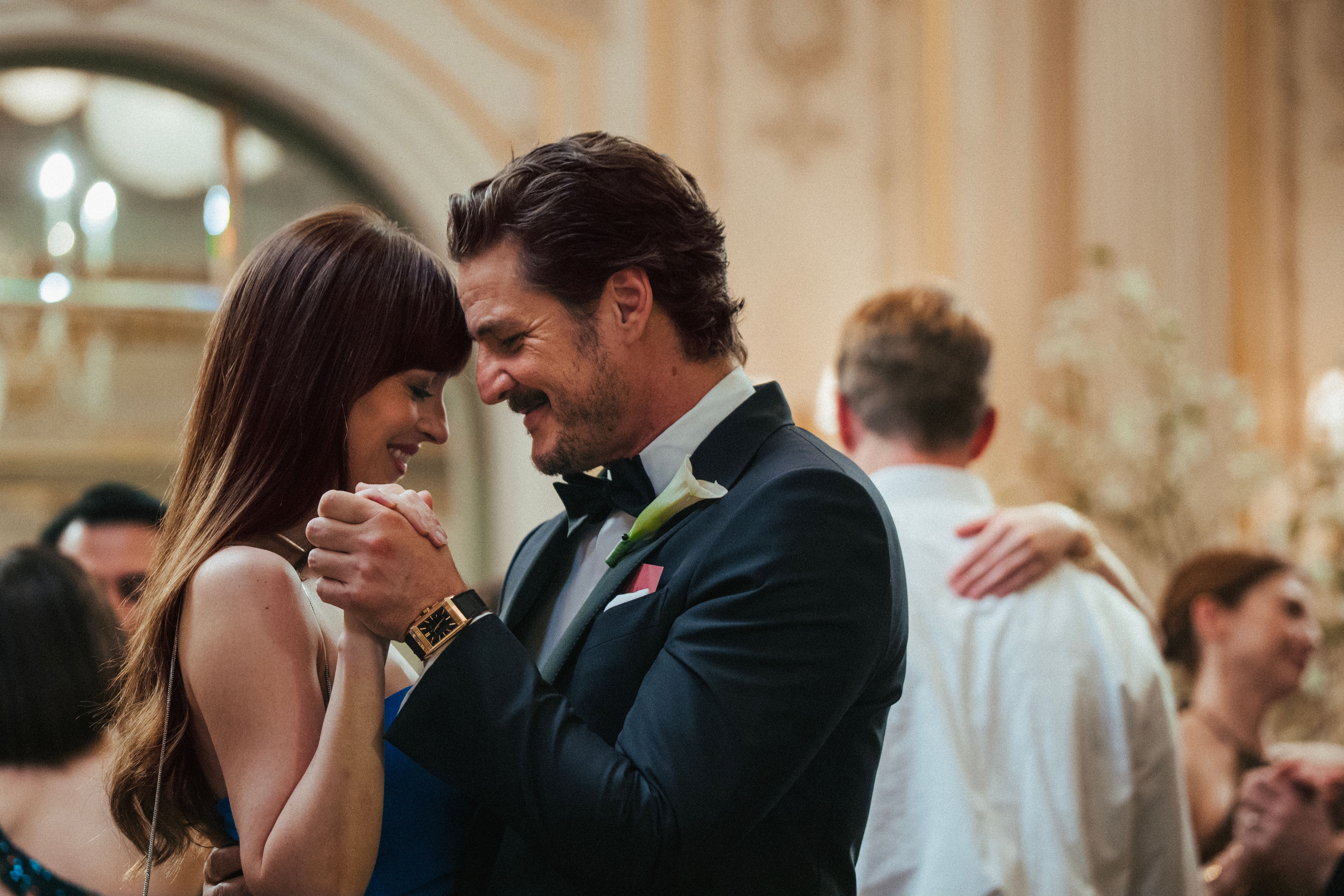Celine Song: Writing from Pre-Production Through Post

By: Ellie Powers
Celine Song is a writer first. “Writing is at the beginning, middle, and end of the process. To me it's the most fundamental part of filmmaking,” writer/director Celine Song says. “First and foremost, I would consider myself a writer. I'm a filmmaker, but I'm a filmmaker via being a writer.”
And an award-winning one at that. Post her explosive debut, Past Lives, Celine presents her sophomore film, Materialists, led by actors Dakota Johnson, Chris Evans, and Pedro Pascal. The film explores themes of love in ways that Past Lives did not necessarily consider from a point of view which Celine herself is intimately familiar.
Lucy (Johnson) works as a matchmaker in New York City. At a wedding of one of her former clients, now bride, Lucy runs into her ex, John (Evans) who is working as a cater waiter. At the same time, she meets the groom’s brother—eligible, rich Harry (Pascal). Enter, love triangle. The matchmaker, the starving artist, and the private equity guy.
When Harry asks Lucy what she looks for in a man, she doesn’t hesitate: “Rich, mind numbingly rich.” She positions herself as someone beneath his milieu, dismissing her own worth in what she refers to as “the marketplace.” From there, Materialists asks how and why we quantify love, when it helps us, and what happens when it delivers diminishing returns. To probe these questions, Celine provides the entry point for the audience in the form of a matchmaker to the elite.

The Matchmaking Call Came From Inside the House
When I ask Celine whether she spoke to matchmakers as research, she grins. “I was one. For six months,” she says. “It was my day job while I was a playwright.”
Those months shaped the film’s core questions. “You're hearing a lot of numbers,” she explains. “This height, this weight, this income. None of these things describe love. They’re describing a commodity, a product, an object.”
And along the way, she noticed how this language seeps inward. “A hateful objectification of others becomes a hateful objectification of yourself. That way of thinking becomes hostile for love to grow.”
Still, she’s careful not to turn Materialists into a clear-cut ethical declaration. The title isn’t just about our obsession with stuff, but about the physical, quantifiable things that tether a life together. Mid-interview, Celine flips the conversation to ask about my love life. I tell her I’m engaged, that we’ve been together for ten years. She lights up.
“It’s never going to be something you can quantify,” she says. “But on the other hand, something that is quantifiable is those ten years. That’s material too. That’s as real as height. You’ve spent all this time together. You were there when this happened, when that happened. That’s what love has always been about.”
She continues: “With the title Materialists, it’s both about rejecting materialism and embracing another person’s physical presence in your life. You live in the same apartment. You share a toilet. A shower. That’s a very material way that you guys are spending your life together. And it’s a very ancient, holy thing.”

Silver Tones on the Silver Screen
From the outset, Celine knew how she wanted Materialists to look. “We did a lot of camera tests, and we fell in love with the way the color looked when we shot on film and the LUT Damien created,” she says, referring to her colorist Damien Vandercruyssen. Along with Cinematographer Shabier Kirchner, the team referenced Damien’s previous work on Priscilla and The Beguiled for Sofia Coppola as inspiration for the silver look they were after (even though Priscilla was shot on digital, Damien notes).
They chased what Song calls “an old silver feeling to the whole image.” Every piece of jewelry Lucy wears is silver. Whenever there’s a choice between gold and silver in a scene, it’s always silver. Silvery shades of white and gray. Even reds and pinks are pushed toward cooler tones.
Shabier recalls a specific visual reference that grounded the aesthetic: “There’s this Gordon Parks photograph of a woman entering a hotel which became an esthetic anchor of the film for us. It has this kind of restrained silvery quality to it which embodied the texture, color and light we had in mind.” The image was so central that every department had it pinned to their walls throughout prep.
That philosophy extended to the choice of medium. Having worked with 35mm film on Past Lives, Celine and Shabier felt using it felt right for this story, especially given their shared desire to “bring silver to the surface of the image.”
However, the silver isn’t static. As the story evolves, so does the palette. “In Act III, the color gradually warms heading towards resolution,” Celine notes. It’s subtle, but as the characters begin to change their views, so too does the visual temperature of the film.
Damien adds that they were careful about what lived in the shadows. “We wanted to be careful about having clean blacks,” he explains. “Shabier really liked the silvery look, but he didn’t want the film to feel like it had color in the blacks. So, we cleaned up the blacks to make sure there was no noticeable tint.”
Damien was part of that conversation from the start, testing film stocks, building LUTs, and keeping an eye on dailies. “We’d see stills, talk about them, and then by the time we got to the DI it all felt seamless,” Damien says. He also ensured that the final grade honored the work of every department: “making sure the color of Lucy’s dress stayed true to Katina’s work or the walls of the Banquet Hall had the right level of warmth Anthony intended,” Shabier notes. “He’s a true artist.”


Rewriting on the Sound Stage
As conscious as Celine is about visuals, she’s even more obsessive during the sound mix. “Writing is also at the end of the process,” she says. “Sound is where the film gets finished.”
Working with Harbor’s Supervising Sound Editor and Re-Recording Mixer Dan Timmons, Re-Recording Mixer Josh Berger, and Sound Effects Editor Ryan Billia, Celine approached the mix like a rewrite. “I’m sitting on the stage saying, ‘There’s this one clinking sound way over there, and we just can’t find it,’ or ‘I feel like the music should rise here, but not at this moment — six frames later.’ That’s the level we’re working on.”
Set in New York, the city’s natural volume became part of the texture. “It’s loud. And the music’s going to be loud. And it all fights to be heard. So, the mix had to find a way for it to still feel clear to the audience: what to listen to and when.”
Ryan recalls the process as both meticulous and creatively fluid: “There were lots of opportunities to explore both subtle and overt sound design. Celine loved having a sound editor on stage who could jump in and edit as the mix progressed. This allowed for the soundtrack to react to Celine’s direction and the mix in real time. There was so much fine detail work in the mix. Both Dan and Josh killed it.”
Dan describes the experience as uniquely inspiring: “The super high level of emotional immediacy that Celine works on was at first a surprise to me, but of course totally makes sense. She’s perfected the art of gently guiding her team toward the most efficient route to maximize the needs of each beat, staging emotional impact and drawing the heart and mind into the story as equal companions.”
He credits the collaborative environment Celine created and the superior talent of the team as essential to that process: “Part of that equation on Materialists was having a ‘big room’—and having the impeccable stages and top-tier talent at our disposal was key to achieving a mix that is full of energy. I believe all of that directly translates onto the screen in the form of a purely transfixing watch.”
In the end, whether through sound, image, or rhythm, every layer of Materialists is calibrated to evoke something just out of reach, what can be quantified and what can be intuited.
Unquantifiable, Miraculous Love
Ultimately, Materialists is a film about knowing your worth (and whether that even matters).
Celine sums it up best herself: “I wish love were a video game. I wish you could complete certain actions and then find love. Unfortunately, it’s a complete miracle when it happens, and a total mystery. It’s beyond our control or our intelligence. And I think that’s what’s so frightening about trying to quantify and turn into analytics the process of looking for love.”
Materialists doesn’t offer answers so much as it holds space for the contradictions: that love is both a feeling and a fact, both ephemeral and deeply material. In a world obsessed with metrics, Celine’s film reminds us that the most meaningful and ancient practice, finding a partner to grow old with, can’t be measured, only lived. And does height really matter when you’re changing each other’s diapers?


